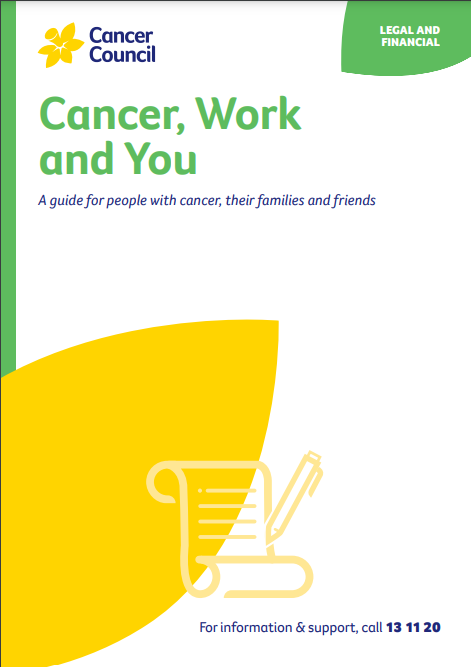- Home
- About Cancer
- Coping with a diagnosis
- Cancer, work and you
- For workers
- Key questions about cancer and work
- Do I have to tell my employer?
Do I have to tell my employer?
Telling an employer that you have cancer is a personal decision and legally you don’t usually have to let them know. You do need to tell an employer about anything that will affect your ability to do the essential parts of your job, or that could reasonably cause a health and safety risk for you or other people. You may need to think about what this means for you now and in the future. For example, will the medicines you need affect your ability to safely do your job?
Learn more about:
Overview
You may want to wait and see how the cancer or treatment affects you first, and then decide whether you need to tell your employer. Or you may want to talk to them right away about the impacts on you and your workplace. It’s your choice.
If you decide to tell your employer, it may help to talk to your doctor first. Your doctor can explain what to expect during cancer and treatment, and how it may affect your work.
If you decide to tell your employer, it may help you:
- discuss the support you need and any changes that could be made to your work
- find out about any benefits available, such as additional leave
- organise flexible working arrangements
- take time off work for appointments or treatment
- reduce the risk that any impacts on your work will be seen as poor work performance.
If there is a chance that your job may have caused or contributed to the cancer, find out if you are entitled to workers compensation. Workers compensation laws may need you to notify your employer of your condition as soon as you can.
Talking to your employer
- You may feel more confident talking to your employer if you practise what you want to say with your family and friends.
- Decide beforehand how much information you want to share. Write down some notes to take with you, so you don’t forget anything.
- Consider having a support person with you to help with the discussion.
- Request a meeting in a quiet, private place where you won’t be interrupted – and allow plenty of time.
- Come to the meeting with some ideas or a plan for your needs, and how any impact on the workplace might be managed.
- Reassure your employer of your commitment to your job.
- Be prepared for your employer to talk about your working arrangements (e.g. they may ask if you want to work part-time or change shifts). If you’re not sure, ask for time to think about it.
- Let your employer know that you may need to revisit any plans you both make, depending on how you cope with treatment side effects, recovery, etc.
- Keep notes about the discussion, including date and time, what information you shared and any requests made. Importantly, write down any agreed changes to your working arrangements for you and your employer to sign.
- Don’t feel that you have to agree on everything in the first meeting. You may both need time to get more information.
- This is a good time to update your emergency contact person with your employer.
- Refer your employer to Cancer Council’s online workplace fact sheets for employers and workplaces. You can check your local Cancer Council website or call Cancer Council 13 11 20.
→ READ MORE: What are my rights to privacy?
Podcast for people affected by cancer
Listen now
More resources
Brooke Russell, Principal Occupational Therapist, WA Cancer Occupational Therapy, WA; Bianca Alessi, 13 11 20 Consultant, Cancer Council SA; Dr Prunella Blinman, Medical Oncologist, Concord Cancer Centre, Concord Repatriation General Hospital, NSW; James Chirgwin, Physiotherapist, The Wesley Hospital, QLD; Danielle Curnoe, Consumer; Simon Gates, Barrister, Tasmanian Bar, TAS; Justin Hargreaves, Medical Oncology Nurse Practitioner, Bendigo Health Cancer Centre, VIC; Kaylene Jacques, Director, People and Communications, Cancer Council NSW; Alex Kelly, Senior People Attraction Advisor, Human Resources, Allianz Australia Insurance, NSW; Legal reviewer; Georgina Lohse, Social Worker, GV Health, VIC; Lesley McQuire, Consumer, Cancer Voices NSW.
View the Cancer Council NSW editorial policy.
View all publications or call 13 11 20 for free printed copies.
Need to talk?
Support services
Coping with cancer?
Speak to a health professional or to someone who has been there, or find a support group or forum
Need legal and financial assistance?
Pro bono services, financial and legal assistance, and no interest loans
Cancer information
Dealing with the diagnosis
Common reactions to a cancer diagnosis and how to find hope
Resource hub
Guides, fact sheets, videos, podcasts and more for people with cancer, their families and friends

